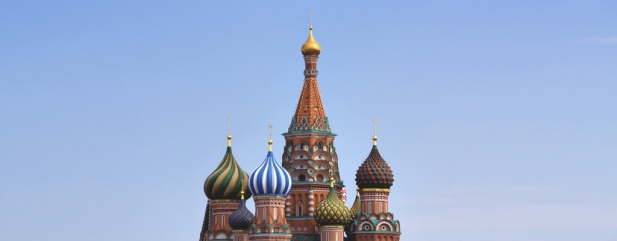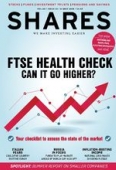Archived article
Please note that tax, investment, pension and ISA rules can change and the information and any views contained in this article may now be inaccurate.
There are more attractions to Russia this year than the World Cup

All eyes will be on Russia next month as the football World Cup kicks off so it is a good time to consider the merits and methods of investing in the country.
To tackle the elephant in the room straight off, Russia has recently been the subject of economic sanctions from the US which, according to Mattias Siller, manager of Barings Emerging Europe (BEE), were done with an ‘ulterior motive’ other than to ruin Russia’s economy.
Artjun Divecha, head of asset manager GMO’s emerging market equity team, agrees. He says if the intent was to hurt Russia economically, sanctioning companies like Sberbank and Gazprom would have had a much more ‘profound impact’.
WHAT ARE RUSSIA’S FUNDAMENTALS
While there are several political issues which obscure the Russian investment case, on a valuation level at least it’s extremely cheap, trading on at an average price-to-earnings of around 7-times while offering a yield of about 5%. The economy is dominated by the resources sector, Barings Emerging Europe having a large holding in Lukoil.
Siller explains with a ‘double whammy’ of a cheap currency and rising oil prices these sorts of companies’ revenues are climbing while their cost base is coming down. This is also increasing the levels of free cash flow these energy companies which he adds is important as the companies are carrying much debt.
‘It’s a jackpot with the currency,’ says Siller.
Barings Emerging Europe is highly exposed to Russia with over 60% exposure. Siller says one attraction to the country’s equity markets is what he describes as the ‘de-synchronised business cycle’.
He explains while most large markets are in a late cyclical growth stage, Russia is on the ‘cusp’ of an early stage recovery which along with attractive valuations is another’ pull’ to the country.
One of the largest of Baring’s trust’s positions is in Sberbank which has had to be reduced to coincide with the trust’s diversification rules.
PROGRESS ON CORPORATE GOVERNANCE
One element of Russia’s draw for investors may surprise; it’s progress on corporate governance, albeit from a low base. ‘The main reason I‘m confident on Russia Inc. is that corporate governance is not just improving it has improved’ according to Siller.
He says this is true of both state-owned and private organisations and a good example of progress is the level of dividends being paid out. He says that Russian companies distribute a third of their earnings as dividends and expects a higher payout ratio going forward.
JPMorgan Russian Securities (JRS) is a pure Russia-focused trust managed by Oleg Biryulyov and did fall foul of the US sanctions introduced by the US on 6 April. While Barings trust hold’s Sberbank, the bank has limited dealings with companies the US imposed sanctions on.
By contrast the JPMorgan trust had around a 1% exposure to Rusal which was directly subject to US sanctions.
This contributed to its net asset value briefly dipping by 7.5% in April.
Unlike Siller, Biryulyov is less convinced of Russia’s corporate governance pedigree. According to a note from broker Numis, the manager has concerns over the running of companies like transport firm Transneft and VTB Bank.
Both Siller and Biryulyov share positive views of the economic state of Russia though. The latter has invested in some large cyclical stocks to play the recovery theme. The valuation metrics of energy giant Gazprom too tempting for either to ignore, trading on a price to earnings of just 4-times while paying a dividend yield of around 6%.
Both managers are skilled stock pickers believing this the best way to play a volatile market such as Russia, especially as the political issues show no sign of abating quickly.
RUSSIAN RISKS
Russia was the best performing country in the MSCI Emerging Markets index in the first quarter of this year before the US intervention.
The issue with geo-political tensions is that there can be a disconnect between the issues and the economic environment. Siller says that ‘political risk is uncorrelated’ and Nicholas Mason, Invesco Perpetual’s emerging market equities fund manager says the rise in political tensions will not ‘detract us from investing in fundamentally strong Russian companies’.
The recent spike in political tensions nonetheless had negative impacts on funds that had holdings in Russia. JPMorgan Russian Securities is trading on a 16.28% discount with Barings Emerging Europe on a 12.59% discount.
GMO’s Arjun Divecha observes: ‘We’ve always said that you make more money when things go from truly awful to merely bad than when they go from good to great. Russia’s relationship with the world is now approaching truly awful’.
Important information:
These articles are provided by Shares magazine which is published by AJ Bell Media, a part of AJ Bell. Shares is not written by AJ Bell.
Shares is provided for your general information and use and is not a personal recommendation to invest. It is not intended to be relied upon by you in making or not making any investment decisions. The investments referred to in these articles will not be suitable for all investors. If in doubt please seek appropriate independent financial advice.
Investors acting on the information in these articles do so at their own risk and AJ Bell Media and its staff do not accept liability for losses suffered by investors as a result of their investment decisions.

 magazine
magazine









